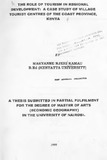| dc.description.abstract | This study examines the role of tourism in regional development using village tourist centres
in the Coast Province as a case study. Addressed specifically are the factors for the
development of the village tourist centres and how the benefits from them trickle down to the
local people and effect change in the region. It also examines the existing linkages between
the tourism industry and the village tourist centres and other related sectors ofthe economy.
The objectives of the study are: (a) To identify existing village tourist centres and related
tourist resources in the region (b) To determine the nature of existing linkages between
village tourist centres and the formal hotel industry and to examine linkages with other
sectors of the economy (c) To assess the participation of the local people in the ownership
and the management of village tourist centres (d) To analyze the problems and constraints
hindering the performance of the village tourist centres in the region.
The null hypotheses tested are: (a) There is no significant relationship between the number of
local people employed and the number of village tourist centres in the region (b) There is no
significant relationship between the amount of income obtained by the local people and the
ownership and management of village tourist centres (c) There are no significant linkages
between the village tourist centres and the formal hotel industry (d) Village tourist centres in
the Coast region are evenly distributed.
A sample of257 was chosen through random, stratified and cluster sampling. Sampling
targetted tourist officials, tourists, curio operators, local residents, hotel managers, tour
operators and village tourist centre's operators. The study employed several statistical
techniques namely: Nearest Neighbour Analysis, Location Quotient and Multiple Linear
Regression Analysis and Multiple Correlation Analysis. Data were gathered through the use
of questionnaires and official records pertaining to the role of tourism in the coast region.
The major findings revealed that factors such as income generation and creation of
employment influenced the entrepreneurs in the establishment of village tourist centres.
Other findings showed that the number of people employed in the centres was strongly
influenced by the amount of income flowing into the centres as well as the number of clients
visiting the centres. Income was viewed as a significant factor in offsetting imbalances
created by unequal distribution of incomes in rural areas, while creation of employment was
in an effort to curb the problem of unemployment which lay heavily on the rural folk.
Statistics revealed that there was a high proportion of local ownership of village tourist
centres which accounted for fifty percent. Unlike other sectors of the tourism industry, the
centres created a platform for local participation where top management jobs accounting for
88.5 percent are held by the local people. Tabulated data revealed the existence of strong
linkages between village tourist centres and the hotel industry. Other important linkages were
between the hotels and the local residents, the village tourist centres and the local residents
and other sectors. Linkages pointed toward a prospective dependency in terms of funding,
employment, leisure and entertainment and marketing. Lack of finances, poor marketing
strategies and policies favouring the village tourist centres were some of the most important
setbacks which hinder the performance of the sector.
This study recommends that the government provides financial assistance and protection to
local entrepreneurs, and develop policies which will favour their business operations. The
study concludes that village tourist centres could be an effective tool to revamp and
stimulate the economy of the region, only if the problems relating to funding marketing and
favourable policies are put in place.
This study offer some important contributions to scholars, to researchers, to the field of
Economic Geography and to the tourist sector in the form of new maps, updated data and
tourism models.
Future research directions for the continuance of what is already in operation, such as the
empowerment of the local people and their incorporation into regional development plans
and management policies as gender imbalance concerns in the industry, are well stipulated in
this study. | en |

